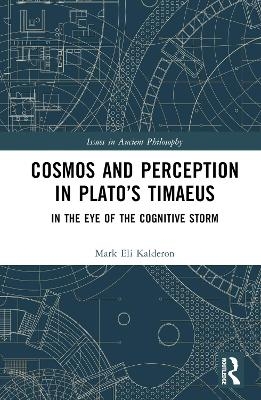
Cosmos and Perception in Plato’s Timaeus
In the Eye of the Cognitive Storm
Seiten
2023
Routledge (Verlag)
978-1-032-27470-6 (ISBN)
Routledge (Verlag)
978-1-032-27470-6 (ISBN)
This volume offers a wide-ranging study on perception in the Timaeus, not only discussing senses such as touch, taste, and olfaction alongside audition and vision, but also engaging with Timaeus’ wider cosmological project. Suitable for students and scholars of the Timaeus and Plato's thought.
This volume offers a wide-ranging study on perception in the Timaeus, not only discussing senses such as touch, taste, and olfaction alongside audition and vision but also engaging with Timaeus’ wider cosmological project.
Most studies of perception in the Timaeus focus on a few narrow passages on vision and audition. By taking the broader approach of this volume, important lessons about the nature of perception may be gleaned from Timaeus’ cosmogony, psychogony, and anthropogony. While there is an emerging modern consensus that the Timaeus should be read literally, this study argues against a literal interpretation of the spatial and kinetic properties of the soul in favour of a metaphorical understanding. Not only does this yield a rich account of the intentionality of cognition but also sheds light onto the nature of the soul-body union. In addition, this volume argues for the largely overlooked significance of Timaean anatomy, as it contributes to our understanding of the providential scheme of Timaeus’ cosmology more generally.
Cosmos and Perception in Plato’s Timaeus is of interest to students and scholars of the Timaeus and Plato’s thought more broadly, as well as those working on ancient theories of perception and the philosophy of mind.
This volume offers a wide-ranging study on perception in the Timaeus, not only discussing senses such as touch, taste, and olfaction alongside audition and vision but also engaging with Timaeus’ wider cosmological project.
Most studies of perception in the Timaeus focus on a few narrow passages on vision and audition. By taking the broader approach of this volume, important lessons about the nature of perception may be gleaned from Timaeus’ cosmogony, psychogony, and anthropogony. While there is an emerging modern consensus that the Timaeus should be read literally, this study argues against a literal interpretation of the spatial and kinetic properties of the soul in favour of a metaphorical understanding. Not only does this yield a rich account of the intentionality of cognition but also sheds light onto the nature of the soul-body union. In addition, this volume argues for the largely overlooked significance of Timaean anatomy, as it contributes to our understanding of the providential scheme of Timaeus’ cosmology more generally.
Cosmos and Perception in Plato’s Timaeus is of interest to students and scholars of the Timaeus and Plato’s thought more broadly, as well as those working on ancient theories of perception and the philosophy of mind.
Mark Eli Kalderon is a Professor of Philosophy at UCL and former editor of the Aristotelian Society. He is the author of Form without Matter, Empedocles and Aristotle on Color Perception (2015), and Sympathy in Perception (2017). His work focuses on philosophy of perception and its history.
1. Proemium; 2. Cosmogony; 3. Psychogony; 4. Cognitive Revolution; 5. Embodiment; 6. The End of Vision and Audition; 7. Common Pathēmata; 8. Peculiar Pathēmata; 9. The Anatomy of Tripartition; 10. The Bonds of Life.
| Erscheinungsdatum | 17.07.2023 |
|---|---|
| Reihe/Serie | Issues in Ancient Philosophy |
| Zusatzinfo | 7 Line drawings, black and white; 7 Illustrations, black and white |
| Verlagsort | London |
| Sprache | englisch |
| Maße | 156 x 234 mm |
| Gewicht | 800 g |
| Themenwelt | Geschichte ► Allgemeine Geschichte ► Altertum / Antike |
| Geisteswissenschaften ► Philosophie ► Philosophie Altertum / Antike | |
| ISBN-10 | 1-032-27470-0 / 1032274700 |
| ISBN-13 | 978-1-032-27470-6 / 9781032274706 |
| Zustand | Neuware |
| Informationen gemäß Produktsicherheitsverordnung (GPSR) | |
| Haben Sie eine Frage zum Produkt? |
Mehr entdecken
aus dem Bereich
aus dem Bereich


